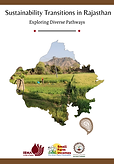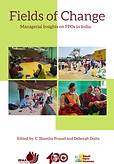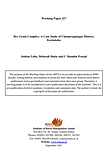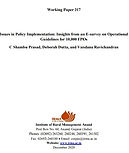Publications
The paper explores the recent thrust towards zero budget natural farming, and makes a case for a broader set of practices based on the principles of agroecology. The study substantiates the argument by characterizing the multiple practices and meanings of agroecology among different actors in Gujarat.
Authors: C Shambu Prasad, Arnab Chakraborty and Deborah Dutta
State of India's Livelihood - Report 2023:
The Chapter is a comprehensive analysis of the challenges faced by Farmer Producer Organisations in India. It offers valuable insights into the evolution of FPOs and the necessary steps to transform these challenges into opportunities for sustaining institutions. It serves as a valuable resource for policymakers, researchers, and practitioners working towards enhancing the livelihoods of farmers in India
Authors: C Shambu Prasad and Deborah Dutta
Towards Learning Alliances in Agroecology
A compendium of blogs covering a vast ground in forming learning alliances, capturing insights from the grassroots and furthering sustainable transitions through producer collectives.
Editors: C Shambu Prasad and Deborah Dutta
A collection of urban-farming stories and perspectives to explore food growing possibilities in Indian cities. You can read Hindi version of this document here.
Editors: Deborah Dutta and Amrita Hazra
Thinking beyond Ecology: Can Reskilling Youth Lead to Sustainable Transitions in Agri-Food Systems?
This paper emphasizes the importance of green and sustainable work in the Global South, particularly in agriculture, to support rural livelihoods. It highlights that top-down approaches like the Green Revolution have led to deskilling and youth leaving farming. The paper calls for a broader focus on ecological and institutional innovations for reskilling and sustainable livelihoods, showcasing case studies of Natural Farming Fellows and a Gandhian university program engaging rural youth.
Authors: Deborah Dutta, C Shambu Prasad and Arnab Chakraborty
Policy making and implementation require consultation and engagement with the various stakeholders involved in the sector. Despite the widely acknowledged importance of consultative policymaking, interventions to encourage stakeholder participation remain scarce. This paper demonstrates how facilitated and well-designed consultations can enable a better buy-in in policy implementation and importantly help build state capacity through such processes.
Authors: C Shambu Prasad, Abhishek Saxena and Deborah Dutta
Reimagining Producer Collectives: Strategic Conversations for a post-pandemic future
A compilation of abstracts of the papers presented in the "Reimagining Producer Collectives" track at the 24th Convention of the Strategic Management Forum held at IRMA, as well as the follow-up work and reflective writing that emerged from it.
Editors: C Shambu Prasad and Abhishek Saxena
Sustainability Transitions in Rajasthan: Exploring Diverse Pathways
A booklet capturing stories from Rajasthan that explore the various pathways of sustainable transitions in agriculture being taken up by farmers, NGOs and institutions.
Editors: C Shambu Prasad and Abhishek Saxena
Shifting Grounds: Transitioning to Sustainable Agriculture in India
A compendium of blogs covering a vast ground in transitioning sustainably to natural farming systems in terms of themes presented, geographies represented and stories documented.
Editors: C Shambu Prasad and Deborah Dutta
Fields of Change - Managerial insights on FPOs in India
A compendium of blogs on management challenges of FPOs in India written by academicians, practitioners and researchers.
Editors: C Shambu Prasad and Deborah Dutta
Fields of Change - Managerial insights on FPOs in India
A compendium of blogs on management challenges of FPOs in India written by academicians, practitioners and researchers.
Editors: C Shambu Prasad and Deborah Dutta
Motivating youth engagement in sustainable agriculture: institutional innovations in Andhra Pradesh community managed natural farming
Engaging with sustainable food systems requires a serious acknowledgement of the knowledge-practice gap in the agricultural domain. The issue is exacerbated by the lack of youth participation in farming. Youth are uniquely poised to become agents of change, as they are also bearing a disproportional brunt of an unsustainable food system. This study explores a novel initiative to motivate and involve youth known as ‘Natural Farming Fellows’ (NFF) by the Andhra Pradesh Community Natural Farming (APCNF) programme. Such initiatives can offer pathways for transformative educational practices.. .
Deborah Dutta and C Shambu Prasad
FPOs as harbingers of agricultural transformation: The significance of credit
Emmanuel Murray has decades of experience in development finance, and has been engaged with FPOs since their inception. The experiences shared through these essays are useful for practitioners and academics alike. .
Emmanuel Murray
Consultation or consultants?
The policy space in India is being reformed in India over the last few years. Many consultancy firms have become dominant players. This article, through the example of the 10000 FPOs policy, tries to see if these trends undercut the consultative processes which are expected for inclusive policy-making.
C. Shambu Prasad
Dry Grain Complex: A Case Study of Chamrajnagar District, Karnataka
The persistence of rural agrarian distress necessitates a greater understanding of regional agroecological food systems. The purpose of this study is to explain the ‘Dry Grain Complex’ (DGC) in Chamarajanagar district, Karnataka, as it functioned (and is now largely marginalised). The study describes this complex within the socio-ecological framework that it operates in, while postulating some key principles that interlink ecologic, economic, and social factors.
Joshua Lobo, Deborah Dutta and C. Shambu Prasad
Policy Interventions in Public Irrigation Systems in Drought Prone Bundelkhand: A Critical Review
The study’s finding indicates that the policy regime has major dependence on certain irrigation strategies and large infrastructure-oriented projects (such as dams and canals), whereas locally suitable water harvesting structures (e.g., ponds and tanks) have been neglected in policy design. Therefore, this study advocates for a paradigm shift away from “irrigation” to “integration” in the long-term policy imagination at national and regional levels, using a holistic approach for on-farm water management and drought mitigation in MP Bundelkhand.
Ayush Vani, Seema Ravandale, C.Shambu Prasad and Debashish Sen
Managing Sustainable Transitions: Institutional Innovations from India
Despite the widespread disruptions of lives and livelihoods due to the COVID-19 pandemic, it could also be seen as a gamechanger. The post-pandemic recovery should address fundamental questions concerning our food systems. Is it possible to reset existing ecologically unsustainable production systems towards healthier and more connected systems of conscious consumers and ecologically oriented farmers? Based on three illustrative cases from different parts of India, we show how managing transitions towards sustainability require institutional innovations and new intermediaries that build agency, change relations, and transform structures in food systems.
C.Shambu Prasad and Deborah Dutta
Issues in Policy implementation: Insights from an E-survey on Operational Guidelines on 10000 FPOs
This paper highlights an innovation of a recent key policy document in Indian agriculture- the operational guidelines for promoting 10,000 Farmer Producer Organisations (FPOs) by 2024. Key stakeholders, representatives from FPOs and their federations, sponsoring and training organisations, donors and other ecosystem players with substantial experience working with FPOs were invited to participate and express their views on the policy document through a detailed e-survey in July 2020.
C.Shambu Prasad, Deborah Dutta and Vandana Ravichandran
Farming as an enterprise- Ten years of FPO movement in India
A recent overview of the FPO ecosystem written by Prof. Shambu Prasad, who has been part of national level policy dialogues to enable effective policies to strengthen FPOs. This is a chapter from the State of India's Livelihoods 2019 Report.
C.Shambu Prasad
Farming Futures: An annotated bibliography on Farmer Producer Organisations in India
Academic research on FPOs is growing but scattered with significant knowledge in ‘grey’ literature produced by practitioners. This annotated bibliography seeks to fill the gap by providing a useful collation of all published material on FPOs in India. The bibliography draws from a research study that sourced literature from research databases through systematic search and other sources via snowballing to produce a knowledge resource that covers the time period between 2003 and 2019.
Gautham Prateek & C.Shambu Prasad

Urban spaces need to radically rethink their relationship with food in terms of production and consumption as climate change, land degradation due to industrialised farming present a serious challenge to food security. Community-based urban farming initiatives are proving to be an effective way to create sensitivity, critical awareness and connection with the land, farmers and ecosystems.
Deborah Dutta
Dharani: Nurturing the earth, fostering farmers' livelihoods
This case study won the first prize in the Oikos Case Writing Competition 2017. It was written by Joseph Satish V (University of Hyderabad, India) and C Shambu Prasad (Institute of Rural Management Anand, India). It discusses how Dharani, (a part of Timbatku collective) not only developed external markets for small farmers' organic produce but also articulated an ethical model of local production, distribution and consumption.
Joseph Satish V and C.Shambu Prasad

Innovating at the margins: The System of Rice Intensification in India and transformative social innovation
Explores social innovation in agriculture through a particular case of agroecological innovation, the System of Rice Intensification (SRI) in India. Insights from social innovation theory that emphasize the roles of social movements and the re-engagement of vulnerable populations in societal transformation can help reinstate the missing “social” dimension in current discourses on innovation in India.
C.Shambu Prasad

_edited.jpg)







.png)












